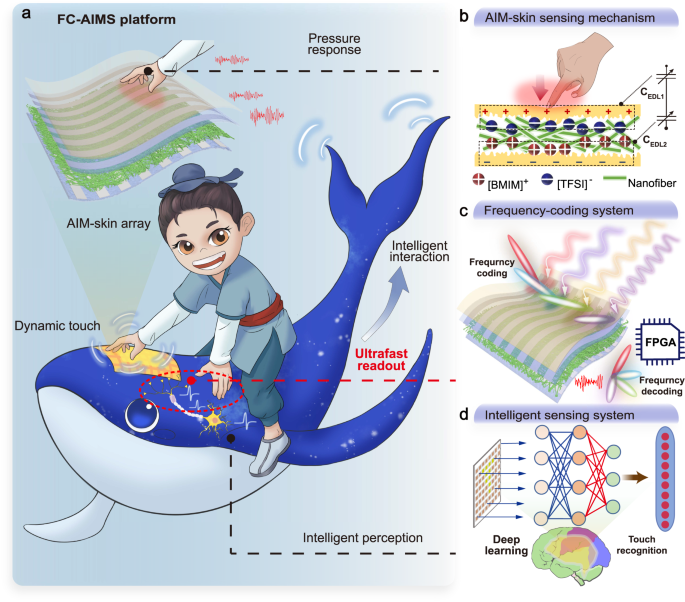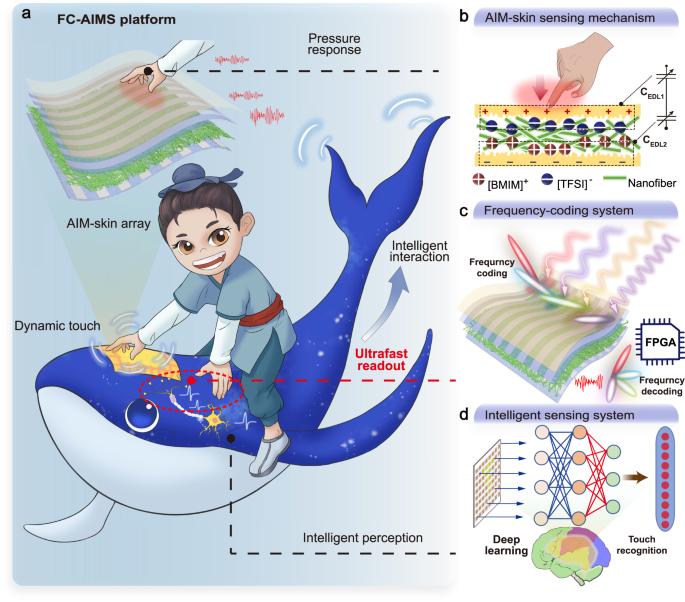利用频率编码架构实现超快读出、串扰抑制离子电子阵列
IF 12.3
1区 材料科学
Q1 ENGINEERING, ELECTRICAL & ELECTRONIC
引用次数: 0
摘要
离子电子皮肤(I-skin)能够在宽压力范围内实现超快传感,可与人体皮肤媲美,这对智能机器人技术至关重要。然而,由于缺乏能在宽压力范围内产生的大电容响应下实现超快读出和无串扰的离子电子阵列架构,这仍然是一个重大挑战。在这里,我们报告了一种人工离子机械感受器皮肤(AIM-skin)的频率编码架构,它可以提供一种通用的离子电子阵列传感模式,并绕过对复杂的集成后端接口电子器件的依赖。值得注意的是,在具有高灵敏度和超宽压力范围的 AIM 皮肤中成功实现了正交频率编码,从而实现了对时空机械刺激的超快并行读取。此外,该结构的并行零电位机制(PZPM)可有效缓解传感单元之间的电串扰。我们已经证明,将所提出的设备与深度学习相结合,在智能人机交互和实时动态机器人操纵方面具有广阔的应用前景。本文章由计算机程序翻译,如有差异,请以英文原文为准。


Ultrafast readout, crosstalk suppression iontronic array enabled by frequency-coding architecture
The development of iontronic skin (I-skin) capable of ultrafast sensing in a wide pressure range, comparable to human skin, is of paramount importance for intelligent robotics. However, this remains a major challenge due to the lack of iontronic array architectures that can achieve ultrafast readout and crosstalk-free under large capacitance response generated within a wide pressure range. Here, we report a frequency-coding architecture of artificial ion mechanoreceptor skin (AIM-skin) that can provide a universal mode of iontronic array sensing and bypass the dependence of complex integrated back-end interface electronics. Notably, the successful implementation of orthogonal frequency coding in the AIM-skin with high sensitivity and ultrawide pressure range achieve ultrafast parallel readout for the spatiotemporal mechanical stimuli. Furthermore, the parallel zero-potential mechanism (PZPM) of the architecture effectively mitigates electrical crosstalk between sensing units. We have demonstrated that combhination of proposed device and deep learning has a broad application prospect in intelligent human-machine interaction and real-time dynamic robotic manipulation.
求助全文
通过发布文献求助,成功后即可免费获取论文全文。
去求助
来源期刊

npj Flexible Electronics
Multiple-
CiteScore
17.10
自引率
4.80%
发文量
91
审稿时长
6 weeks
期刊介绍:
npj Flexible Electronics is an online-only and open access journal, which publishes high-quality papers related to flexible electronic systems, including plastic electronics and emerging materials, new device design and fabrication technologies, and applications.
 求助内容:
求助内容: 应助结果提醒方式:
应助结果提醒方式:


